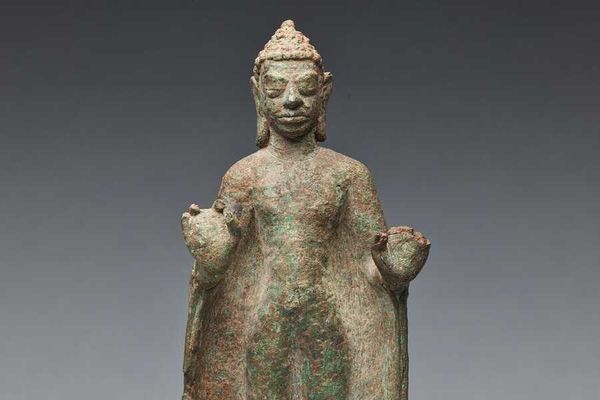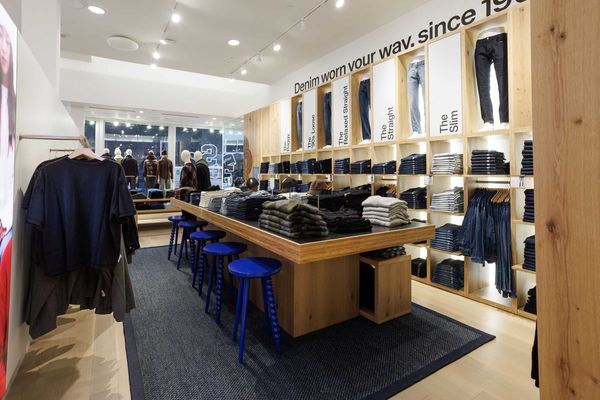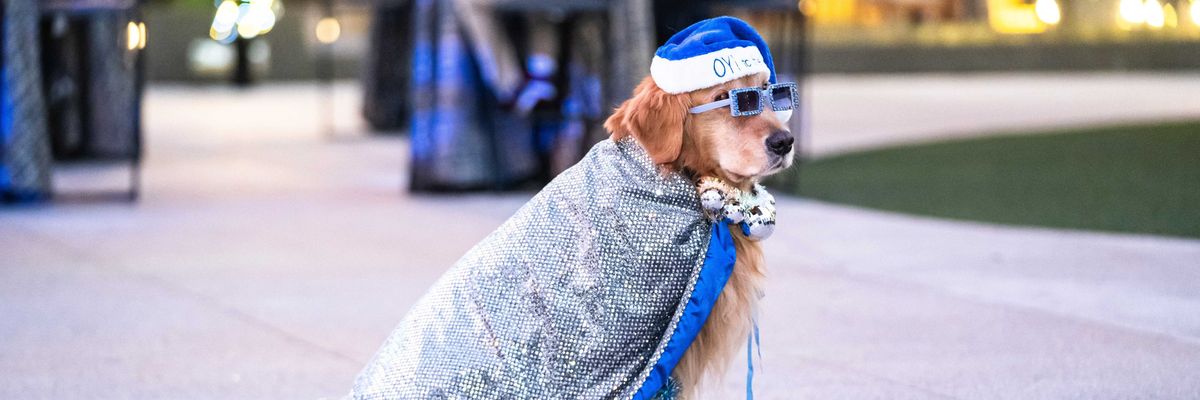Little wonder that the nimble-footed Fred Astaire played a fashion photographer so clearly based on Richard Avedon in the 1957 musical, Funny Face: He ideally translated the supple movement and sublime grace of Avedon’s ‘50s fashion photography (and love of Hungary’s Martin Munkacsi) in his portrayal, all while snapping the radiant Audrey Hepburn.
But Avedon was so much more than the landmark shots that have entered the visual vernacular. More than, say, Dovima caressing the elephants in a surreal juxtaposition of the rough and the wild against the silkily draped and the divine artful (Dovima incidentally also had a teensy cameo in Funny Face as the ditzy swan with a grating whine).
A working shooter who managed the seemingly effortless leap into fine art photography, Avedon obviously created so many images before his sudden 2004 death, while on assignment for The New Yorker, that this show can only scratch the surface of innumerable contact sheets. I don’t envy the task of exhibition organizer Helle Crenzien of the Louisiana Museum of Modern Art in Denmark, for his task in editing Avedon’s sizable output. Or do I? Regardless, the first major retrospective of the photographer’s work since his death, “Richard Avedon: Photographs 1946-2004” -- which makes its only U.S. stop at San Francisco Museum of Modern Art and opens Saturday, July 11 -- manages to encapsulate Avedon’s central themes and turning points, even only succinctly: from a sprinkling of post-World War II street snaps to his Paris fashion photos, from his portraits of figures from both the U.S. counterculture and political establishment to his still-vivid series on denizens of the American West.
There are some amazing images here, many bringing home Avedon’s intelligent use of white space, his sophisticated sense of composition, and the alternately bold and subtle way that he commented on and critiqued his subjects with cropping and perspective. How does the artist really feel about, for instance, the off-center William S. Burroughs and the monumental Marianne Moore? A sad-eyed and visibly deflated Marilyn Monroe sharply repudiates a positively vibrating, Pomeranian-like Brigitte Bardot. And of course, Avedon had an exacting eye for the crucial moment: The withered, wincing, exposed Ezra Pound sings volumes louder than the text by Truman Capote that originally accompanied the image.

Richard Avedon's Katharine Hepburn, actor, New York, March 2, 1955.
Naked emotion was only one part of Avedon’s display, while nudity is in full flaming force when it comes to his group portrait of Andy Warhol and the Factory habitués -- a nude and clothed Joe Dallesandro, cupid-faced, long-tressed, and surprisingly stubby, bookends either side of the composition, while gorgeous tranny Candy Darling lets it all hang out in the center. In contrast, Avedon’s series of portraits of D.C. politicos dance between opacity and banality with a few exceptions: among them, a fresh-faced senator from Illinois named Barack Obama.

Richard Avedon's Boyd Fortin, 13-year-old rattlesnake skinner, Sweetwater, Texas, March 10, 1979.
Of course, Avedon’s tour de force remains his In the American West series, commissioned by the Amon Carter Museum in Fort Worth, Texas, and rivaling Edward Curtis’ portraits of American Indians. The burning gazes, weather-beaten eloquence and undeniable elegance of these images still sear the retina, almost three decades after they first emerged. Tellingly, the art-schooled aficionados of Sonic Youth chose to appropriate Avedon’s photo of Sandra Bennett for their original Sister album cover, placing the work in the same rarified high-low league as those by Gerhard Richter and Richard Prince. And it’s a tribute to Avedon’s prowess as an image-maker that one leaves the exhibit wishing you could see even more.
"Richard Avedon: Photographs 1946-2004” opens Saturday, July 11, and runs through Nov. 29. San Francisco Museum of Modern Art, 151 Third St., S.F. Hours are Mon.-Tues., Fri.-Sun., 11 a.m.-5:45 p.m.; Thurs., 10 a.m.-8:45 p.m. Admission is $12.50, $8 seniors, $7 students, free for members and 12 and younger (free on the first Tues. and half price Thurs., 6-8:45 p.m.). (415) 357-4000, www.sfmoma.org.




















